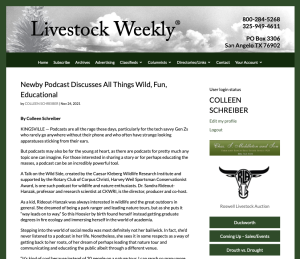
Newby Podcast Discusses All Things Wild, Fun, Educational

KINGSVILLE — Podcasts are all the rage these days, particularly for the tech savvy Gen Zs who rarely go anywhere without their phone and who often have strange looking apparatuses sticking from their ears.
But podcasts may also be for the young at heart, as there are podcasts for pretty much any topic one can imagine. For those interested in sharing a story or for perhaps educating the masses, a podcast can be an incredibly powerful tool.
A Talk on the Wild Side, created by the Caesar Kleberg Wildlife Research Institute and supported by the Rotary Club of Corpus Christi, Harvey Weil Sportsman Conservationist Award, is one such podcast for wildlife and nature enthusiasts. Dr. Sandra Rideout-Hanzak, professor and research scientist at CKWRI, is the director, producer and co-host.
As a kid, Rideout-Hanzak was always interested in wildlife and the great outdoors in general. She dreamed of being a park ranger and leading nature tours, but as she puts it
“way leads on to way.” So this Hoosier by birth found herself instead getting graduate degrees in fire ecology and immersing herself in the world of academia.
Stepping into the world of social media was most definitely not her bailiwick. In fact, she’d never listened to a podcast in her life. Nonetheless, she sees it in some respects as a way of getting back to her roots, of her dream of perhaps leading that nature tour and communicating and educating the public albeit through a different venue.
“It’s kind of cool because instead of 20 people on a nature tour, I can reach so many more, and from anywhere,” says Rideout-Hanzak.
The podcast came about more or less because of the Harvey Weil Sportsman Conservation Award, which supports research and education in the conservation of natural resources. Weil, a longtime South Texas sportsman, attorney, conservationist and Rotarian, dedicated his life to the preservation of nature and sportsmanship.
After serving his country during WWII, Weil graduated from the University of Texas and Harvard Law school. He became known as the Dean of maritime lawyers having represented the Port of Corpus Christi for 42 years and serving on several marine related boards. He was also a founding member of the National Marine Science Institute and the Development Council of the Texas State Aquarium.
Additionally, he was a guiding influence in the establishment of the Rob and Bessie Welder Wildlife Foundation. As his attorney, Weil encouraged South Texas rancher Rob Welder to set up the foundation to promote research and education in wildlife conservation and management and to endow it with mineral resources.
Given Weil’s background and interests, priority for the grants are given to projects involving marine and wildlife species and their habitats and to recreational hunting and fishing. Since 1998, over $1 million in grants have been awarded.
Last fall, in preparation for the award’s 25th anniversary, in their call for proposals, the group asked specifically for proposals that would somehow showcase all the work that the award fund had done over the years. What that kept saying to Rideout-Hanzak was, “we need a podcast.”
She tossed the idea around with a couple of her colleagues, but no one was that interested. She realized then that the problem was she was talking to people her age and who she really needed to be talking to was the younger crowd. She did so and their enthusiasm for the project moved her forward.
She and a graduate student wrote up a proposal for a wildlife podcast. The pitch was that they would discuss anything related to wildlife, marine life, natural resources, hunting, fishing, conservation, invasive species, exotic species in Texas, the gamut really.
“Texas is a big place,” she points out. “There’s a lot of stuff going on. Here in the state, we’ve got everything from mountains to true forests to true deserts, plus we’ve got the Gulf of Mexico, so we’ve got fish and dolphins and sea turtles, too.”
The team brainstormed potential podcast names. “A Talk on the Wild Side” was the one that stuck.
The proposal pitch hit gold with funding for two years. The logistics for the development of a podcast got underway.
Live since June, the podcast airs every other week on the various podcast platforms including Apple podcasts, Google Podcasts, Amazon Music, Spotify and iHeart Radio. Their target audience is namely wildlife and nature enthusiasts but also those who are interested in a bit of science as every podcast features a passionate expert in their field for the topic of that particular podcast.
Most of the topics come about through brainstorming sessions. Again, the goal is for the podcast to be fun and interesting but also educational.
To that end, the podcast kicked off with a session on quail with expert commentary from CKWRI’s Dr. Fidel Hernandez, on how color in a quail’s environment might help cue hormonal changes in charge of reproduction. An upcoming episode is on sea turtles with input from Dr. Donna Shaver, a National Park Service employee, who as Rideout-Hanzak put it, almost singlehandedly saved the Kemp’s Ridley sea turtle from extinction. There was also an episode on the endangered ocelot with cat expert Dr. Mike Tewes, one on dolphins and horned lizards to native plants and not so native plants to bear ecology.
They’ve covered several white-tailed deer topics. One focused on deer management, specifically “to cull or not to cull” while CKWRI’s Dr. Randy DeYoung discussed with a catchy title “white-tailed deer dating, there’s not an app for that.”
They’ve also tackled tougher topics, some of which are perhaps a bit controversial including such things as chronic wasting disease. More recently in a two-part series, David Newstead, Director of the Coastal Bird Program at the Coastal Bend Bays and Estuaries Program, discussed impacts of SpaceX rocket testing and launching on wildlife and habitat in South Texas.
“It’s unbelievable what they’re already doing – above what they were given permission to do by FAA in 2014, in their original EIS,” says Rideout-Hanzak. “Now the FAA is considering a draft programmatic environmental assessment for new things that SpaceX wants to do, and it could really be devastating to wildlife.”
Insofar as co-hosts, it’s sort of a revolving door of TAMU-Kingsville students, who, for short bouts, have the time to put into a podcast. She has other students who do the editing. Andrew Lowery, the technical editor in all things sound and production, so to speak, has been particularly helpful. Before becoming a student at TAMU-Kingsville, he was producing music videos in Los Angeles.
To date they have had 3000 downloads with international subscribers from places like Germany, India and Australia. The reviews have been good, and the podcast continues to move up in rankings. Most recently they were ranked 36 among the top 100 nature podcasts.
She appreciates that not every podcast will be of interest to every subscriber, and the organizers of the podcast are okay with that. They do, however, have some who have listened to every single one.
The creator and co-host has also learned to use other social media platforms. She now finds herself “tweeting” on the weekends in her spare time about an interesting article on whitetails, for example, as a way to also promote the podcast.
She admits that early on she and her team were so caught up in figuring out how to go about developing a podcast that they failed to realize what it would take to promote it. Getting it up and running was no simple task either. Being at a university, the whole process was cumbersome.
“I joke that it would have been a whole lot easier to do if I was a junior high kid recording a podcast in my mom’s walk in closet,” she quips.
Nonetheless, Rideout-Hanzak is happy, for now, to be climbing the charts, though she won’t be satisfied until she has millions of downloads.